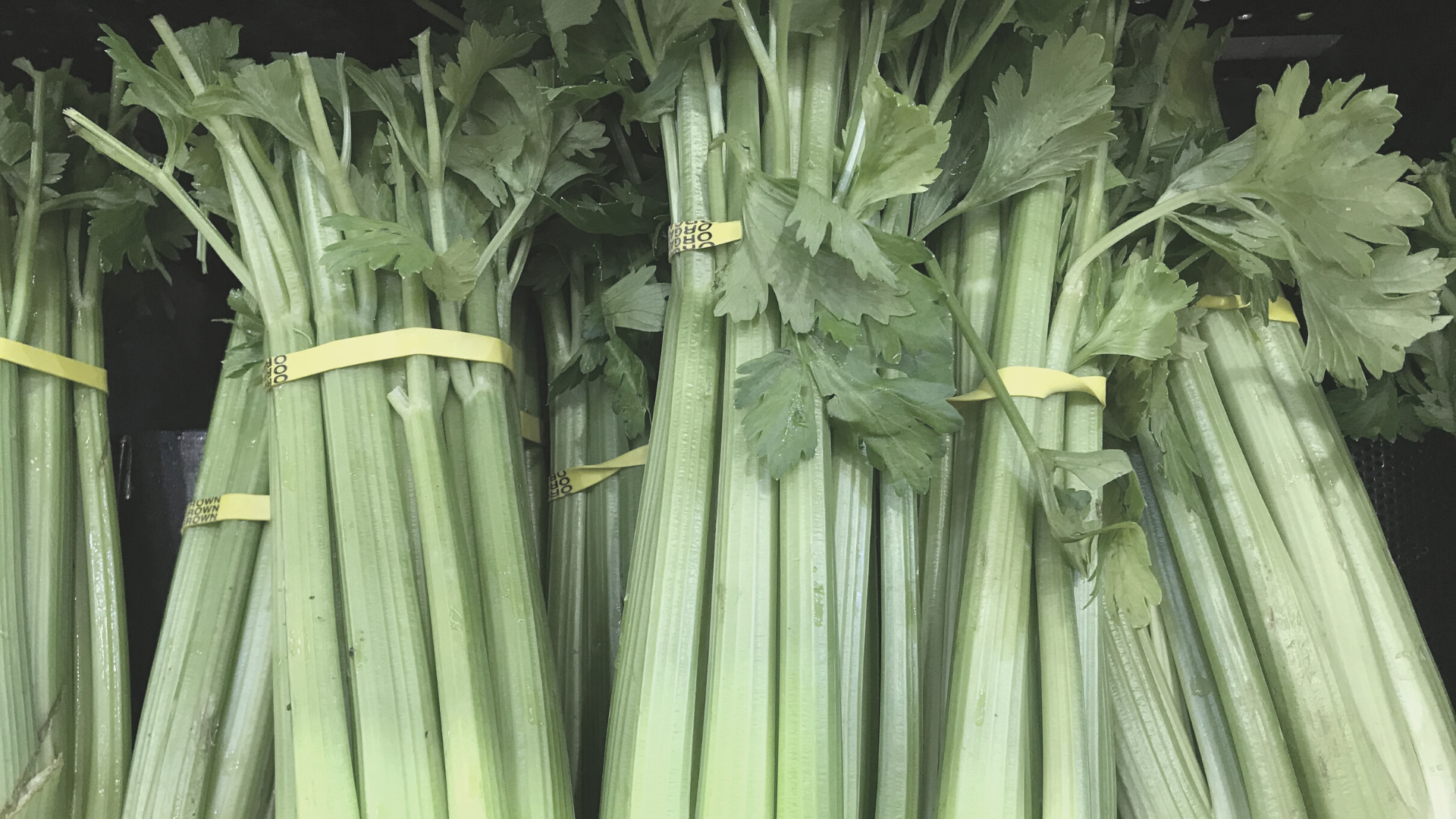Because I believe in the power of L-glutamine for gut healing, I wanted to understand the exact parameters regarding an l-glutamine dosage for leaky gut.
And thus, I thought I’d share my findings with you. They might surprise you!
What is L-Glutamine?
Click HERE to save this article on L-Glutamine dosage for leaky gut for later.

From my book A Gutsy Girl’s Bible,
Glutamine is an essential amino acid that is anti-inflammatory and necessary for the growth and repair of your intestinal lining. L-glutamine acts a protector and coats your cell walls, acting as a repellent to irritants.
Additionally,
Researchers are finding that it plays a critical role in healthy digestion and brain function.
And you can learn more about that HERE.
Glutamine is the body’s most abundant amino acid, representing approximately 40% to 60% of the total amino acid pool in the body, playing a crucial role in various physiological processes, including protein synthesis, immune function, and (of course) maintaining the integrity of the gut lining.
Glutamine is required to perform a variety of essential functions in the human body.
Often referred to as the multitasker, glutamine is a nutrient with an impressive range of health benefits. It helps support normal blood glucose metabolism, build lean muscle tissue, and promote a normal immune system response.*
In the gut, glutamine promotes the health and function of the mucosal cells for normal repair. Furthermore, glutamine distributes nitrogen freely to the cells that need it the most, such as the immune cells, the gut cells, and the muscle cells.
What is a Leaky Gut?
Because I wrote an entire book on Leaky Gut back in 2019, I do know a thing or two about it.
In fact, not only did I write the book, but I also healed my own leaky gut.
So what exactly is a leaky gut?
In the simplest terms, Leaky Gut Syndrome is when the cells that make up the lining of the intestinal tract become so inflamed that the gut lining becomes more permeable than it’s meant to be.
Eventually, the walls that line the intestinal tract become permeable to the degree that undigested food particles and gut flora enter the bloodstream. (Source)
It is a condition that refers to a dysfunction in the lining of the intestines.
The intestinal lining acts as a barrier with tight junction, controlling the passage of substances from the intestines into the bloodstream.
In the case of leaky gut syndrome, this barrier becomes compromised, allowing undigested food particles, toxins, and bacteria to leak through the intestinal wall and enter the bloodstream.
So, then, how might you know you have a leaky gut?
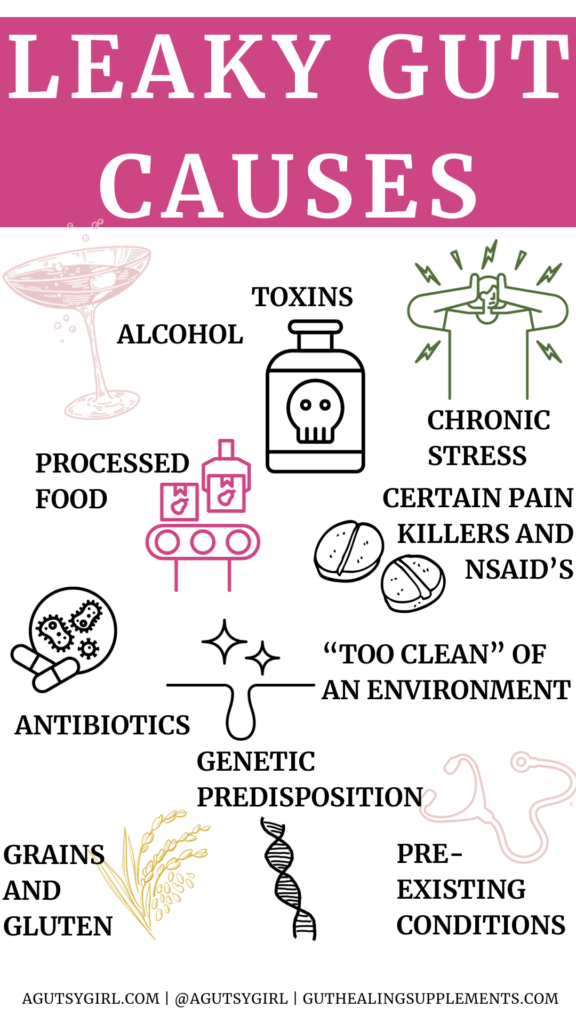
Symptoms of Leaky Gut
There are many ways you might know if you have a leaky gut, but here are 11 I’ve talked about at length over time:
- Digestive system symptoms, including gas, bloating, constipation, diarrhea or a combination of them all
- Seasonal allergies or asthma
- Hormonal imbalances
- An autoimmune disease
- Chronic Fatigue Syndrome or Fibromyalgia (including joint pain issues)
- Mood and mind issues (ADD, ADHD, etc.)
- Skin issues like acne and rosacea
- Candida overgrowth
- Food allergies, food sensitivities, and food intolerances
- Inflammatory Bowel Disease (Ulcerative Colitis, Crohn’s, Celiac, etc.)
- Headaches
(Sources: 9 Signs You Have a Leaky Gut, What is Leaky Gut, Leaky Gut Syndrome: What You Should Know About Your Gut Bacteria)
L-Glutamine for Leaky Gut
One of the 6 main benefits of l-glutamine is its implications for leaky gut.
If you’ve been told you have leaky gut syndrome, then L-Glutamine has been found to prevent and/or repair Leaky Gut. (source)
In one study, rats that received glutamine supplementation prior to radiation reduced the incidences of leaky gut. Most rats that didn’t receive glutamine in their diet developed leaky gut (increased intestinal permeability), whereas the rats that did receive glutamine had intact guts [27].
Leaky gut is a matter of gut integrity and by fueling the mucosal cells of the digestive tract, glutamine helps strengthen the integrity of the intestinal wall to support a healthy gastrointestinal tract.
L-glutamine works for leaky gut because it is the most abundant amino acid (building block of protein) in the body.
It is the primary fuel source for the cells that line your intestinal wall.
This in turn does everything from producing more intestinal mucous (a good thing) to regenerating gut cells and helping form tight junctions (remember, leaky gut is a matter of chronic inflammation which has caused those tight junctions to loosen – i.e. become more permeable than they should be).
And, if you want to really have your eyes opened to the positive effects of l-glutamine, check out Table 1 from this NIH study, “Role of Glutamine in Protection of Intestinal Epithelial Tight Junctions.”
[Also from that article is this: Several animal studies demonstrated that experimentally-induced hyper permeability can be alleviated by the addition of glutamine or glutamine peptide leading to improved gut barrier function as well as immune function in the gut (56). Gut barrier dysfunction and endotoxemia are associated with the pathogenesis of inflammatory bowel diseases, such as ulcerative colitis and Crohn’s disease. Glutamine supplementation significantly reduced clinical and endoscopic scores in patients with ulcerative colitis (60). Therefore, both experimental studies and clinical observations indicate that glutamine plays a crucial role in maintenance and restoration of gut barrier function.]
L-Gutamine Dosage for Leaky Gut
So now that you have a little background on both leaky gut and l-glutamine, let’s talk about the supplementation of l-glutamine and how much l-glutamine to take.
[This information is not intended to be specific medical advice, but rather my own experience and research with l-glutamine and other dietary supplements. ]
At The Center for Internal and Integrative Medicine, Dr. Eddie Fatakhov, M.D. advises this for his patients:
For my patients I recommend the following maintenance protocol for its simplicity and effectiveness: take 10 to 15 grams of 100% L-Glutamine powder with 8 ounces of water every morning and evening for a period of two weeks.
Now, you might look at that and think, “No way would I take that much; I’ve been taking 1-2 grams daily.”
But first, ask yourself — well, how has taking 1-2 grams daily been working for me?
Then, consider this: there are some who swear by the crucial role l-glutamine plays in gut repair and thus follow the Charles Poliquin L-Glutamine protocol, which includes up to 80 grams of l-glutamine daily in order to heal the gut and encourage fat loss.
But let’s say you don’t buy into the 80g idea and large doses. (I personally don’t think you need that much in order to reap the potential benefits of l-glutamine.)
Well, there is still research to support a higher dose:
One study showed that children had decreased intestinal permeability when they took 24g of L-Glutamine every day (9). This is over 10 times the recommended dosage. The other group got 15g of a placebo every day for 10 days. At the end of the study, the group who got the higher concentrations of L-Glutamine saw significant improvement in their gut health. Another study with 20 patients who underwent abdominal surgery showed that taking high amounts of L-Glutamine can improve their gut health. In this double-blind study, participants were split into two groups and given 30g of L-Glutamine and a placebo (10). After seven days, researchers found reduced inflammation levels and a more well-maintained intestinal barrier in the patients who got the L-Glutamine supplement.
Regardless, the bottom line is that your traditional’s doctor of a lower dose (1 gram of l-glutamine supplements daily) or worse yet no l-glutamine supplementation could be stalling your healing progress.
I personally think that l-glutamine is misunderstood and/or not understood at all, which is why those in the gut healing community don’t take it seriously enough.
I have from the beginning, and saw massive results because of it.
L-Glutamine Supplementation for Intestinal Health
Now that you are more privy to the reasons for getting enough l-glutamine, the question is:
Which glutamine supplement to try?
Naked Glutamine
This l-glutamine powder is:
- vegan
- dairy-free
- gluten-free
- soy-free
- non-GMO
- no additives
And here’s more about it.
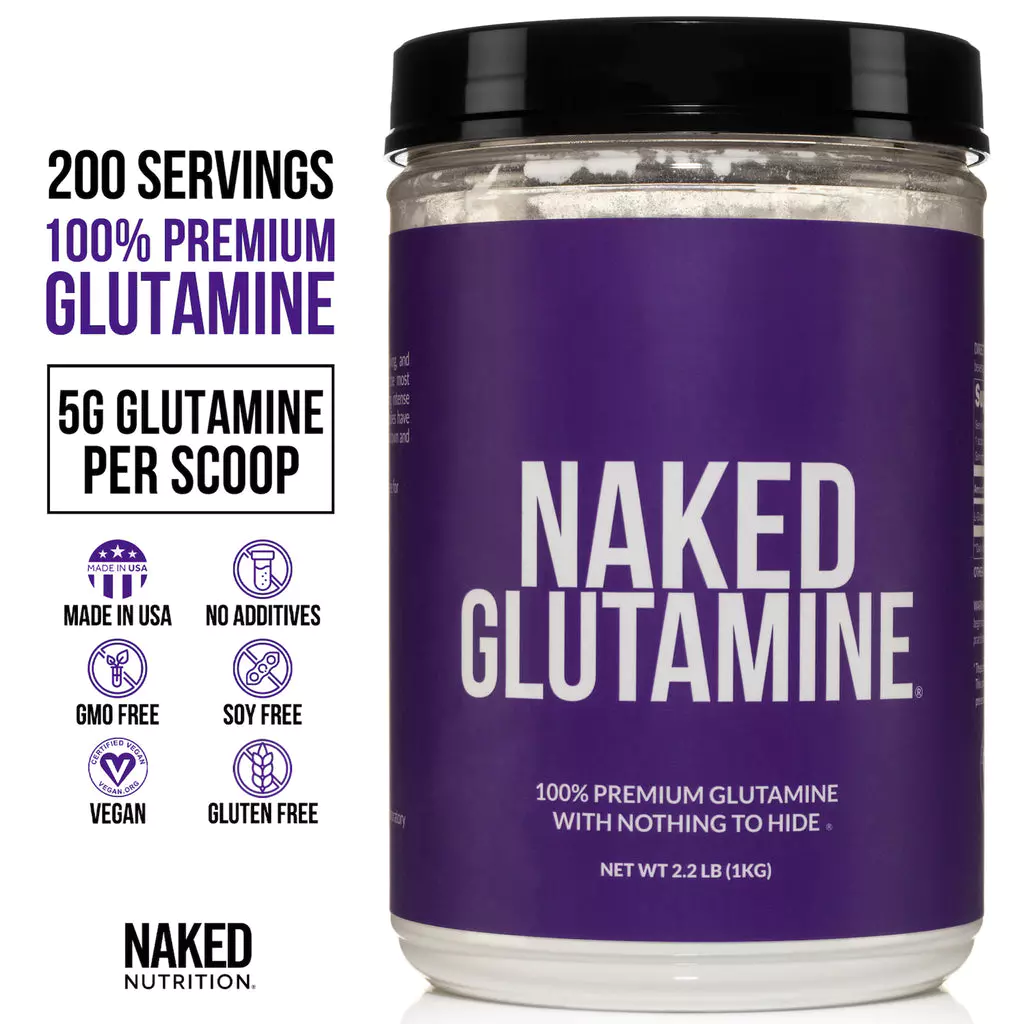
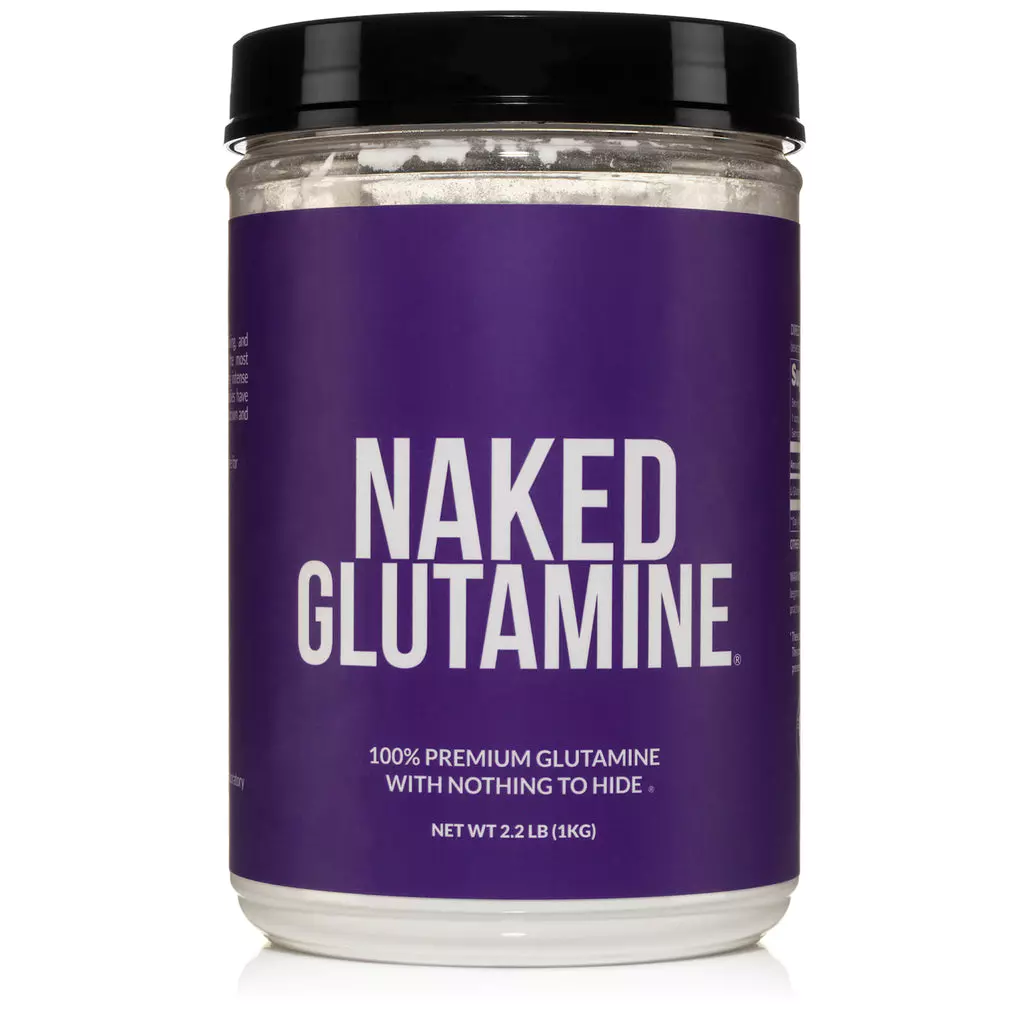
This L-glutamine product:
- is a free form powder
- contains 5 grams of L-Glutamine per scoop (serving)
- is the only ingredient (= L-Glutamine) — there are no additives or fillers
- maintains super high quality
5 Grams of Glutamine
To ensure you’re getting enough glutamine, refer to the above information.
As this high-quality l-glutamine contains 3 grams, you can opt to put 2-3 scoops into a shake or smoothie a few times a day and monitor results, noting any side effects or adverse reactions in your gut-healing journal.
But also, since it’s measured at 5 grams per scoop, you could also start here and then gradually increase the amount you’re taking until you reach higher doses.
You might consider something like this:
- Work up slowly to 10 – 15g (at least to start) over 3 days. If you’ve never taken L-glutamine, I’d suggest not starting at 15g.
- Day 1: A scoop of Naked Glutamine in the morning and a scoop at night. (= 10 g)
- Day 2: A scoop of Naked Glutamine in the morning, one scoop mid-day, and a scoop at night. (= 15 g)
- Day 3: Same as day 2, but add in 1/2 scoop around your most active time of the day. So, if you like to workout, schedule it around then. (= 17.5 g)
- Then stay at that dose for a week.
- Then once you hit day 10, re-evaluate. Are you tolerating it well and want to increase a little? Or, are you comfortable staying here?
I personally do around 6 – 10 grams daily for maintenance.
How to Use Naked Glutamine
Because this is one of the highest grade forms of glutamine and is unflavored, it’s super easy to incorporate into your daily routine.
Even with the plain, unflavored pure L-Glutamine powder, I don’t just put it in water and drink it. You could, but it will not be very good.
The good news is that you don’t have to, either.
Instead, I incorporate it into other things I’m already eating and drinking.
The 4 main things I add L-Glutamine to are:
- my power gluten-free oatmeal bowl in the morning
- Gut Healing Chia Pudding
- smoothies (Don’t want to make a high-quality smoothie? Then try THIS instead.)
- bone broth (It’s even one of my bone broth boosts HERE.)
Remember, just make sure you’re using the best glutamine powder. 🙂
What is the best time to TAKE L-GLUTAMINE
According to the Mayo Clinic, it’s best to take L-Glutamine with meals or snacks.
I take L-Glutamine in powder form vs capsule form, and thus, like the probiotic, collagen, and IgG, I add it right on/in/with meals for proper absorption.
Many people take L-Glutamine as part of their athletic performance, too, since it helps preserve muscle tissue and increases muscle recovery.
In this case, it can also be beneficial to take it with your post-workout meal.
Foods that Naturally Contain L-Glutamine
If you’re looking to also include foods in your diet that naturally contain l-glutamine, this is an excellent option as well.
However, the reason I talk about L-glutamine in supplement form so often falls in line with what Dr. Josh Axe mentions on his website,
It’s estimated that 70 million Americans now suffer from digestive diseases, so it’s apparent that our diets severely lack certain nutrients that support the digestive tract. While L-glutamine is synthesized by the body from glutamic acid or glutamate, sometimes the body is unable to produce enough — plus the majority of people don’t seem to get enough L-glutamine from their food alone if they eat low-protein diets.
So many of us in the Gutsy community are part of that 70 million Americans stat.
EVEN STILL, HERE ARE SOME FOODS THAT NATURALLY CONTAIN L-GLUTAMINE:
- fish
- other seafood
- red cabbage – a good one for those of you who avoid animal products
- milk
- cheese
- yogurt
- eggs
- nuts
- seeds
- soy – choose wisely here; miso or organic tofu, anyone?!
- red kidney beans – another great plant source
- dark leafy greens
- seaweed
- bone broth
- grass-fed beef
- asparagus
- venison
- parsley
- legumes
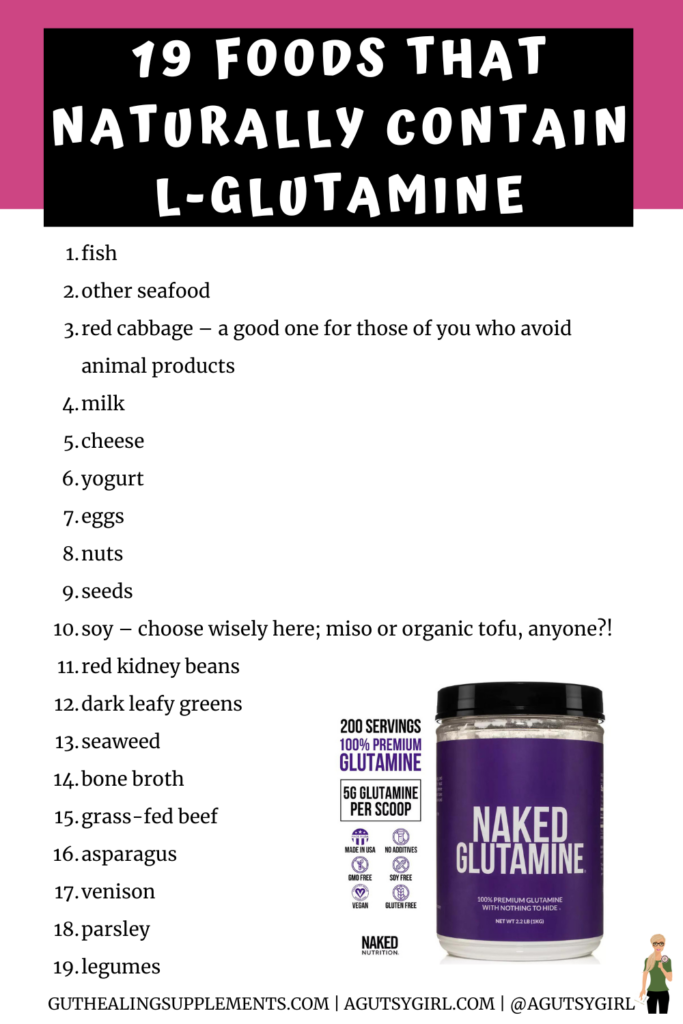
Leaky Gut Supplements
If you’re interested in more supplements for leaky gut, here are 14:
- HCL (Betaine) with Pepsin
- Digestive Enzymes
- Digestive Bitters
- Zinc
- Probiotics
- Omega-3 fatty acids
- Vitamin D3
- Vitamin K2-7
- Collagen
- Prebiotic
- Coconut oil (as a supplement)
- Leaky Gut Revive
- Glutagenics Powder
- Tummy Soothe
Learn more about all of them via Leaky Gut Supplements.
If you liked this post on l-glutamine, you might also enjoy:
- All About Irritable Bowel Syndrome
- GI Tract
- What are Herbal Bitters? (Gut Health Guide to Digestive Bitters for Digestive Issues)
Xox,
SKH
🤰 bloating be gone! weight loss through optimal gut health for women
💃ʜᴇᴀʟ ʏᴏᴜʀ ɢᴜᴛ. ʜᴇᴀʟ ʏᴏᴜʀ ʟɪfe.
🫶🏻 founder gutbyome.com

